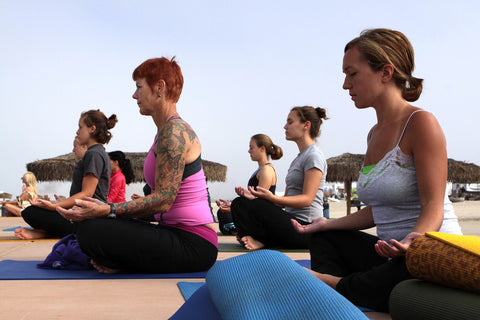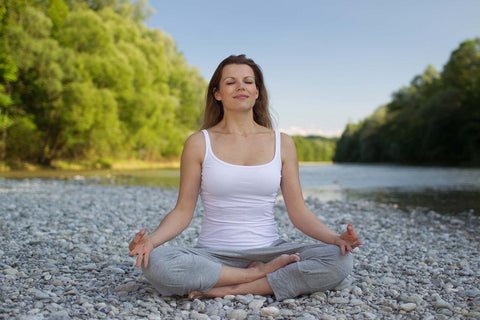
What is Mindfulness?
In our fast-paced world, we're all looking to slow down a little every now and then, but as the world gets more hectic and complicated, it may become harder and harder for us to find that peace. That is where mindfulness comes in.
Practising mindfulness can help you to be in the present moment and can help with stress reduction, as well as being able to deal with negative emotions. But if you're reading this and wondering what mindfulness is, then we've got you.
We've taken some time to do some research into what mindfulness is, how to practice mindfulness, and how to bring mindfulness-based stress reduction into your everyday life. Keep reading to find answers to questions like what is mindfulness and how can mindfulness help me.

What is mindfulness?
So, what is mindfulness?
Mindfulness is the practice of being aware and of the present moment. Sometimes considered a form of meditation, mindfulness can include breathwork, guided imagery, and other techniques that help to reduce stress and relax the body.
Mindfulness is about becoming aware of your thoughts and feelings, your bodily sensations, the surrounding environment, and using these to feel a sense of grounding. It is also about accepting your thoughts for what they are, recognising them, and allowing them to pass through you. Mindfulness teaches us that that there is no right or wrong way to feel and offers no judgement on anything you feel.
Mindfulness forces us to tune into the present moment, feel and be aware of things that are happening around us and in our own head and has us accept these things. Mindfulness is about being present, feeling grounded, and learning to understand our own minds.
History of mindfulness practice
Before we get into the benefits of mindfulness, it may be helpful to understand where mindfulness came from and how it came into the mainstream.
Mindfulness has its roots in Buddhist traditions. It grew out of a number of Buddhist teachings and philosophies, though the mainstream mindfulness training came from a secular reimagining.
Mindfulness has lots of links with Buddhist thought.
Mindfulness aims to help one know their own mind in a similar way to Buddhist teachings on the subject. Knowing the mind and learning to reflect without judgement can help us to understand who we are and accept who we are, rather than judge it. Practising mindfulness can help you to know yourself, your thoughts, and your feelings better.
Practising mindfulness and knowing your mind can help to train your mind. Another touch on Buddhist teachings, mindfulness helps one to train their mind, learning to accept thoughts and feelings as they are. This goes hand in hand with knowing your mind and being in the present moment.
And lastly, Buddhist philosophy aims to free the mind of judgement and encourages it to accept which is how mindfulness aims to reduce stress and anxiety in the body. Practising mindfulness daily can help you to free your mind of judgement and allow you to accept the way you feel, who you are, and how you find yourself.

Benefits of mindfulness
Mindfulness comes with a range of benefits. Though helpful for slowing down and calming your body, practising mindfulness can also help in a range of other ways. To find out more about the benefits of mindfulness, keep reading and learn why you should practice mindfulness too.
Improves wellbeing
Mindfulness can be a fantastic tool to help improve your mental well-being. The practice is designed to make you feel and understand yourself better, accept your thoughts for what they are, and be in the present moment. All of these qualities of mindfulness exercises can help to boost your mental wellbeing.
Mindfulness supports the feelings that make you feel more fulfilled and practising mindfulness can help you to feel more satisfied. Feeling like this can also help you to feel more pleasure and joy in your everyday life, leading to stress reduction. Mindfulness helps you to feel better in yourself and mindfulness-based cognitive therapy is frequently prescribed in patients suffering from poor mental wellbeing.
Improves physical health
The mind and the body are linked in a range of ways and poor health in one can lead to poor health in the other. As mindfulness practices help you to feel more at ease, more satisfied, and more relaxed, this can have a profound effect on the body.
Practising mindfulness can help with stress reduction, can reduce chronic pain, lower blood pressure, improve sleep, and is thought to alleviate gastrointestinal difficulties as well as helping to treat heart disease.
Mindfulness training is about paying attention and being in the present moment but these mindfulness skills can actually really help to improve, not just your mental health, but your overall health too.
Improves mental health
An improvement in mental wellbeing can help to improve mental health conditions, mindfulness can help your mental health by helping your mental wellbeing.
When you practice mindfulness, you are training yourself to be aware and in the present moment and this mindfulness practice can help to improve a number of conditions, including:
- Depression
- Substance abuse
- Eating disorders
- Obsessive-compulsive disorder
- Anxiety disorders
Though mindfulness training is not a cure-all for every mental health condition, practising mindfulness exercises and utilising mindfulness-based stress reduction can help to improve and treat mental health conditions.
Reducing rumination and worry can help to stop anxious thoughts and overthinking and mindfulness practice trains the mind to see these thoughts for what they are and move on from them. This can be incredibly helpful to a range of mental health conditions.
In addition, paying attention, being aware of negative emotions, and being present in the moment can all help to relax the body, calm the mind and aid in the treatment of poor mental health.
Mindfulness training is frequently prescribed as part of treatments for mental health conditions and has seen fantastic results in those who have used it.

Mindfulness and mental health
As discussed previously, mindfulness is a common treatment plan for mental health conditions. A benefit of mindfulness practice is that it can make you feel relaxed as well as calm your worries. Mindfulness is a key tool in treating poor mental health.
There are a few ways that mindfulness is incorporated in mental health treatment, these include:
Mindfulness-based cognitive therapy
This mindfulness practice is usually used to prevent a relapse in recurrent depression. It combines the techniques used in mindfulness, including mindful breathing, guided meditation, and stretching, with therapies used with cognitive behavioural therapy to help break the pattern of negative thoughts that is commonly associated with depression.
Mindfulness-based stress reduction
Mindfulness-based stress reduction deals with prolonged feelings of stress that cause havoc to your mental and physical health. Mindfulness-based stress reduction, or MBSR, can be used as a one-off for those who do not suffer prolonged poor mental health or it can be incorporated into other kinds of therapy.

How to practice mindfulness
Now that we've taken a look at the benefits of mindfulness and how it can be used to help you in your everyday life, we're going to take a look at some mindfulness practices that can help you out.
Practising mindfulness shouldn't be difficult and can be incorporated easily into your daily routine. Try out some of these techniques a few times and see which ones feel right to you.
Mindfulness techniques
There is a range of different mindfulness techniques you can try, from the simple practices that can be done quickly in your daily life, to some that require a little more thought and some time set aside.
Below, we've broken down these techniques into two categories, ones you can do quickly in your day-to-day life, and the ones you might need to plan a few minutes to try out. Check them out below.
Simple mindfulness practice
These techniques are things you can incorporate into your daily routine. They can be done on the bus, on a walk, or even as you wash up. They usually force you to be in the present moment and allow you to relax the body quickly.
Take a look at these simple mindfulness practices below:
- Pay attention. This one seems very obvious and very easy, but in the fast-paced world we live in we can sometimes miss everything that's going on around us as we head to the next thing and the next thing. Take a moment to really look around you. Sense the things you see, hear, smell, feel, and just be in the moment. This technique can be very grounding and pulls you straight back to the here and now.
- Live in the moment. This kind of advice has always seemed to come from inspirational speakers but what we mean by this is to take pleasure in the tiny things that happen in your day-to-day life. Smile at the barista who gives you your morning coffee and enjoy your drink as you think about how good it is to have a warm beverage in the morning. Taking time to experience joy can allow you to see how truly beautiful life can be.
- Accept yourself. This may seem difficult at first, especially if you struggle with self-esteem issues, but you can start out small. Before admonishing yourself, think about how you would react to a friend who had made a mistake. Speak to yourself like this, allow yourself to accept who you are. Being kinder to yourself can help you to feel better about yourself in general and help you feel more satisfied.
- Focus on your breathing. This is an easy one if you start to feel overwhelmed. Simply focus on your breathing as you inhale and exhale. Let your breath be your anchor as you come back to the present.
Mindfulness exercises
There are many mindfulness exercises you can practice but some take a little more time. Below, we have listed a few of these techniques that require a little more thought but can help you train your mind in the art of mindfulness.
Take a look below to find out more.
- Body scan. This exercise involves lying on your back, preferably on a bed or somewhere comfortable, and scanning your whole body. Starting with your toes, focus on every sensation in them, then move up through your feet, legs, abdomen, chest, arms, and head. Be aware of every sensation, everything you feel in each part of your body. This exercise can make you feel grounded and make you aware of your own body.
- 5-4-3-2-1 method. This grounding exercise can be done in a variety of ways but the idea is that you use your senses to list the things you notice around you. An example would be to list five things you see, four things you hear, three things you can touch, two things you can smell, and one thing you can taste. This exercise can help pull you back to the present and is comparable to the previous section where you were asked to simply pay attention to the things around you.

Mindfulness meditation
Like with the techniques in the previous section, mindfulness meditation can take up more time and space and may require you to set aside time to practice it. Mindfulness meditation combines the two practices together and allows you to practice your mindfulness while in a relaxed state.
To find out more about mindfulness meditation, keep reading.
- Sitting mindfulness meditation. Like with all meditation practice, this involves sitting with a straight back, eyes relaxed but not closed, and breathing steady. You should focus on the breath moving through you and if any distracting thoughts enter your mind, accept them and then return back to the breath which works as an anchor in this exercise.
- Walking mindfulness meditation. This should be done slowly at first, but once you're used to it you can practice it whenever you walk. This practice involves experiencing all of the sensations of walking, from the pressure on your soles to the movements of the muscles in your thighs, as you move. Being aware of these sensations and nothing else can help you be in the present.
Mindfulness and aromatherapy
Mindfulness works well with aromatherapy. Using essential oils with a calming effect, like lavender oil, chamomile oil, or sandalwood oil, can help to ground your practice further. Using an aromatherapy diffuser to allow these scents to fill your room before sitting down to practice your mindfulness meditation can enhance the experience and help you feel anchored by the calming effects of the essential oils.
Conclusion
Mindfulness has its roots in Buddhist philosophy and aims to train the mind to be accepting, free of judgement, and calm. Mindfulness comes in many forms and can help your mental well-being as well as your mental health. Practising mindfulness can help you feel more grounded, more satisfied, and more relaxed.
Frequently Asked Questions
What exactly is mindfulness?
Mindfulness is the practice of being in the present moment and being aware of what is happening around you. Mindfulness techniques help to ground you and help you feel more pleasure and joy in life. Mindfulness exercises can include being aware of the sensations around you and in your body, using the breath as an anchor, and meditation and is frequently used in mental health treatment.
What is an example of mindfulness?
Mindfulness examples include taking a moment to notice the world around you, taking in the sounds and sights and letting them be your focus. It could involve feeling joy in the small things, a smile, a good meal. Mindfulness techniques ask the person to focus on the present moment, the breath, their senses, anything to anchor them to the present.
Is mindfulness the same as meditation?
Mindfulness is considered a state of being. You practice mindfulness until it becomes a part of who you are. Meditation is a practice in itself. Meditation involves mindfulness but the two are not synonymous and you need to practice mindfulness while you meditate.
How do I start a mindfulness practice?
Mindfulness is easy to incorporate into your daily life. You could start small by practising mindfulness, like noticing the things around you and taking joy in the small things, or perhaps you could begin by adding a few minutes of mindfulness exercise, such as the body scan, into your day. Using mindfulness in small chunks daily can help you to build up the quality and allow it to become a state of being.

Leave a comment